1ª rodada 27/10 – 2ª rodada 28/10
29/10/21 – 3ª rodada;
54 Partidas do Open
25 partidas femininas:
Transmissões da 3ª rodada:
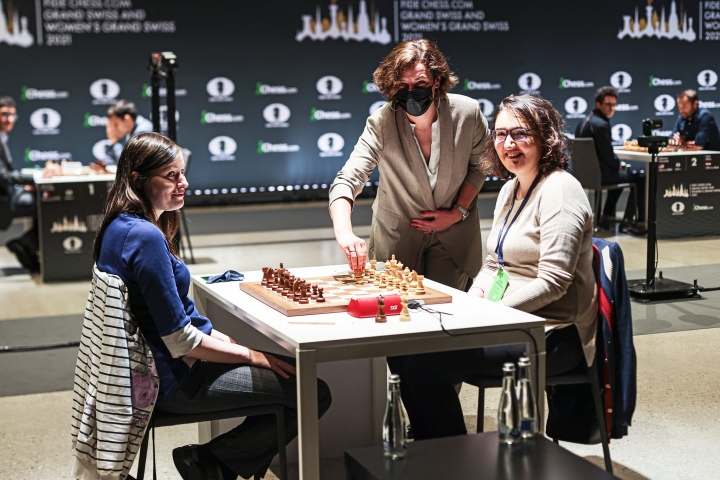
Após três rodadas de jogos em Riga, dos 157 participantes, a francesa naturalizada Alireza Firouzja tornou-se a única jogadora – em todo o Grand Swiss – a vencer os três jogos
A terceira rodada do Grand Swiss foi aberta pela diretora executiva da FIDE, Dana Reizniece-Ozola,fazendo o primeiro movimento a bordo de um dos torneios femininos. Esta é a primeira vez que o Grand Swiss apresenta uma seção feminina. “A FIDE está fortemente comprometida em melhorar o xadrez feminino, e ter o torneio feminino foi muito importante. Além disso, a Letônia – meu país de origem – é um lugar onde aproximadamente metade dos cargos gerenciais são ocupados por mulheres, sem cotas, mas, naturalmente, este parece ser o lugar natural para lançar uma luta maior para as mulheres no xadrez”, diz Dana Reizniece-Ozola.
O Torneio Aberto
Após três rodadas de jogos, a estrela iraniana de xadrez Alireza Firouzja conseguiu se distinguir como a única líder na seção Aberta do Grand Swiss.

Playing on the first board, Firouzja was up against Alexandr Predke who had a spectacular win in the second round against Nodirbek Yakubboev. In the Ruy Lopez, Firouzja gradually arranged his pieces, slowly numbing Black’s resistance. With a strong bishop on b2 and an extra pawn in the centre, he exerted serious pressure on Black’s position. However, Alireza did not find the most precise moves and Alexandr managed to transpose into an even endgame at the cost of a pawn. Firouzja pressed on and, after a trade of the rooks in the 42nd move, White gradually regained the advantage making the most of Black’s inaccuracies. Predke continued to resist, but White’s b-passer became the decisive factor – Firouzja ultimately forced his opponent to resign, having played for nearly six hours.
On board two, Fabiano Caruana was leading white pieces against Ivan Saric of Croatia (pictured below), who had an excellent start with two out of two. Before this game, the two met five times with Caruana leading two to one, with two draws. After dropping half a point in round two to Nihal Sarin, the world number two Caruana – who had white – was eager to win against Saric.
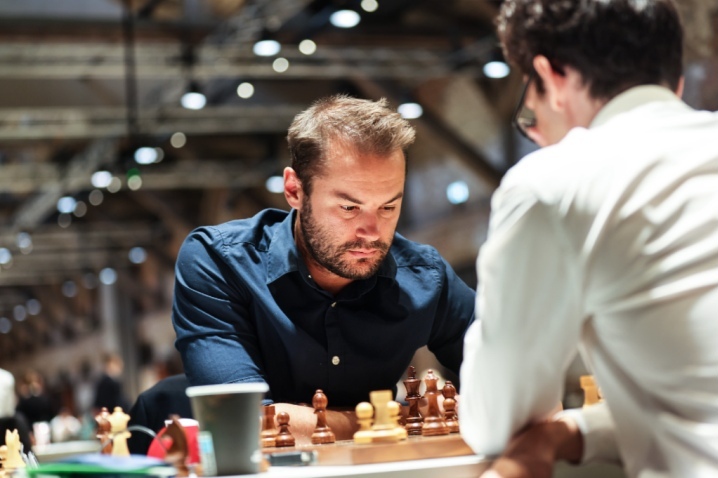
Caruana managed to grab the initiative in the Four Knights Sicilian at the cost of being low on time. After Black castled on the queenside, White launched a dangerous attack on the left wing, which gave him an extra pawn and the decisive advantage. However, when the time came to rip the harvest White captured on g5 with a wrong piece and missed a clear win:
Fabiano Caruana – Ivan Saric
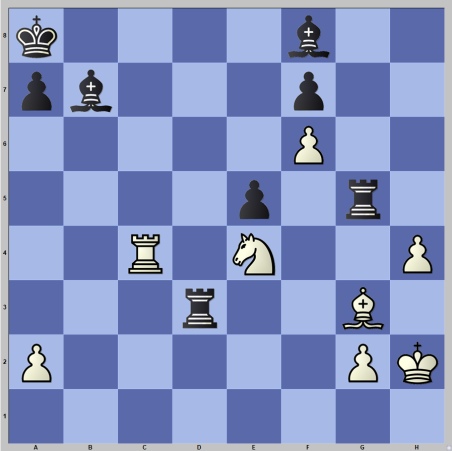
Most likely, Fabiano instinctively turned down 31.Nxg5, wary of 31…Rd2 but after 32.Bxe5 Rxg2+ 33. Kh3 White captures the f7-pawn, winning. Instead, 31.hxg5 was played and after 31…Rd4! 32.Rc7 Bxe4 33.Rc8+ Kb7 34.Rxf8 Bg6 the game transposed into an opposite-coloured bishop ending in which the Croatian defended well, and after nearly five hours, the two agreed to a draw.
There was almost a big upset on board three in the game between Levon Aronian and Anton Demchenko. In the Four Knights opening, the game progressed normally, but after an imprecision in the middlegame by Aronian – who is the fifth strongest player in the world – White’s queen penetrated the queenside, leading to the loss of a pawn by Black. Demchenko gradually advanced his free runner on the a-file, and after the exchange of the queens, the game entered a rook endgame that looked extremely dangerous for Black. After a heroic effort and having shown patience and defiance, Aronian managed to save a draw but not without some help from his opponent, who missed a couple of winning continuations.

One of the top seeds, Maxime Vachier-Lagrave, drew as Black with Alexander Donchenko. With two out of three, the Frenchman still has strong chances to fight for the top.
The first game with a decisive outcome in the Open section was one between Vasif Durarbayli and Daniil Dubov, in which the Russian instructively exploited his dominance over the light squares. Also among the top boards, Yu Yangyi was victorious against Matthias Bluebaum.

Há agora seis jogadores atrás de Alireza Firouzja por meio ponto: Yu Yangyi, Pavel Ponkratov, Robert Hovhannisyan, Nihal Sarin, Ivan Saric e Evgeniy Najer.
Torneio Feminino
Após apenas três rodadas, não há mais jogadores com pontuação máxima na seção feminina. O grupo principal é composto por nove jogadores com 2,5 pontos, liderados por Nana Dzagnidze, da Geórgia.
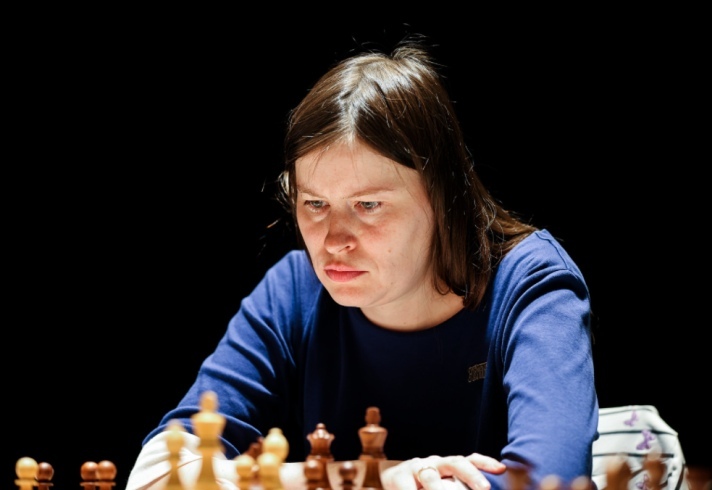
Nana Dzagnidze, que teve um começo perfeito com dois de dois, se viu em apuros como Branca contra Natalija Pogonina (foto acima). A abertura de Reti foi jogada, onde White joga lentamente, tentando gradualmente superar o adversário. Após 11.g4, a posição rapidamente aguçou, e Pogonina veio com um sacrifício interessante de peão. Dzagnidze aceitou a oferta, mas caiu sob um ataque vigoroso. Presa no contrapé, Nana teve que desistir de sua rainha, e a posição transcorreu em uma torre e dois bispos contra uma rainha e cavaleiro no final do jogo. Nana construiu uma espécie de fortaleza que não parecia inatacável, mas usando as imprecisões de Black, o georgiano manteve sua linha de defesa, e o jogo acabou sendo desenhado.
A bordo dois, Harika Dronavalli derrotou a ex-campeã mundial Antoaneta Stefanova, embora, na maior parte do tempo, Black não corresse o risco de perder. No entanto, a búlgara fez uma escolha errada em um final de jogo que custou seu meio ponto:
Harika Dronavalli – Antoaneta Stefanova
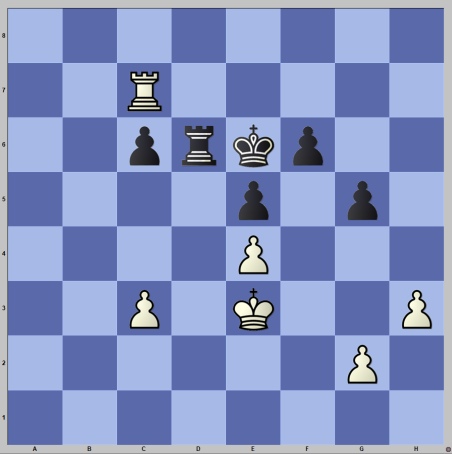
Being in some sort of zugzwang, Antoaneta decided to keep material equal and played 38…f5? but after 39.exf5 Kxf5 40.g4+ Kg6 40.Ke4! things went downhill for her. Black should have sacrificed a pawn instead (38…c5! 39.Rxc5 Rd1) to activate her rook with good drawing chances.
Round 3 saw the – so far – shortest game of the tournament. On board four, after some 40 minutes of play, Elisabeth Paehtz drew as White against Lei Tingjie. The Ruy Lopez was played, and after massive exchanges in the centre, the two ended up in a drawish endgame. After 30 moves of play, the opponents decided to split a point.
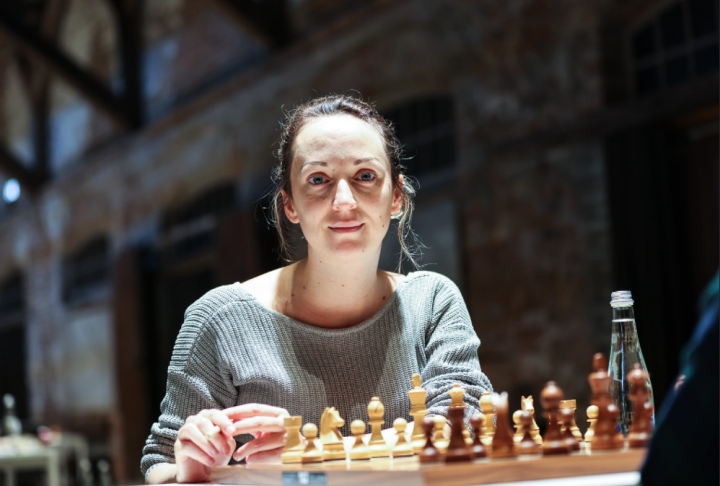
Shortly after this, another quick draw occurred – between Salome Melia and Olga Girya. As was noted by Anna Muzychuk, there are clear lines that lead to a draw, and it’s usually White’s choice if they want to go for that line or not.
Nino Batsiashvili drew her game with Zhu Jiner, and both are now on 2.5 points.
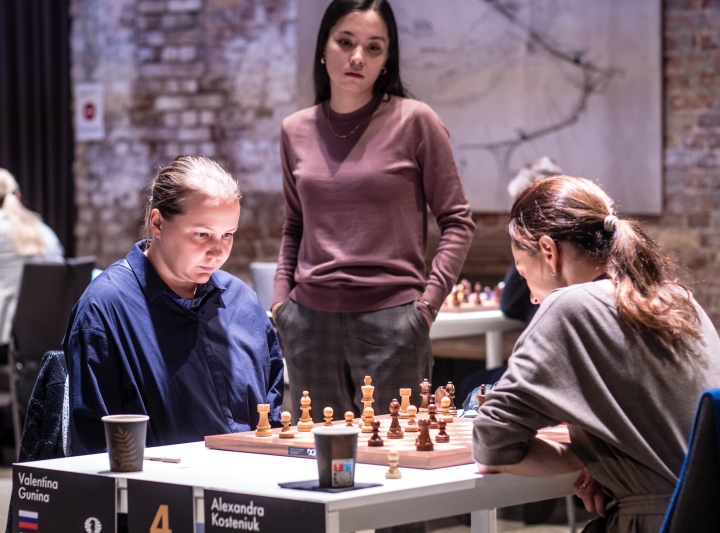
Alexandra Kosteniuk – the former women’s World and European champion and this year’s winner of the Women’s World Cup – played against the four-time Russian champion and three-time European champion Valentina Gunina with Black. Alexandra solved all the opening problems in the Ragozin, but the position was too dry to tip the balance in someone’s favour.
On board eight, one of the youngest rising stars in women’s chess Zhansaya Abdumalik opted for an interesting gambit line in the Rossolimo Sicilian as White against Ukrainian IM Nataliya Buksa. On move 15, Abdumalik correctly sacrificed a bishop for an initiative in the centre, preventing Black’s king from castling. After a series of mutual inaccuracies, a roughly equal endgame emerged on the board in which White had a small initiative. It did not take Black too long to make a grave mistake that spelt defeat – Abdumalik snatched two pawns and handily converted her advantage.
